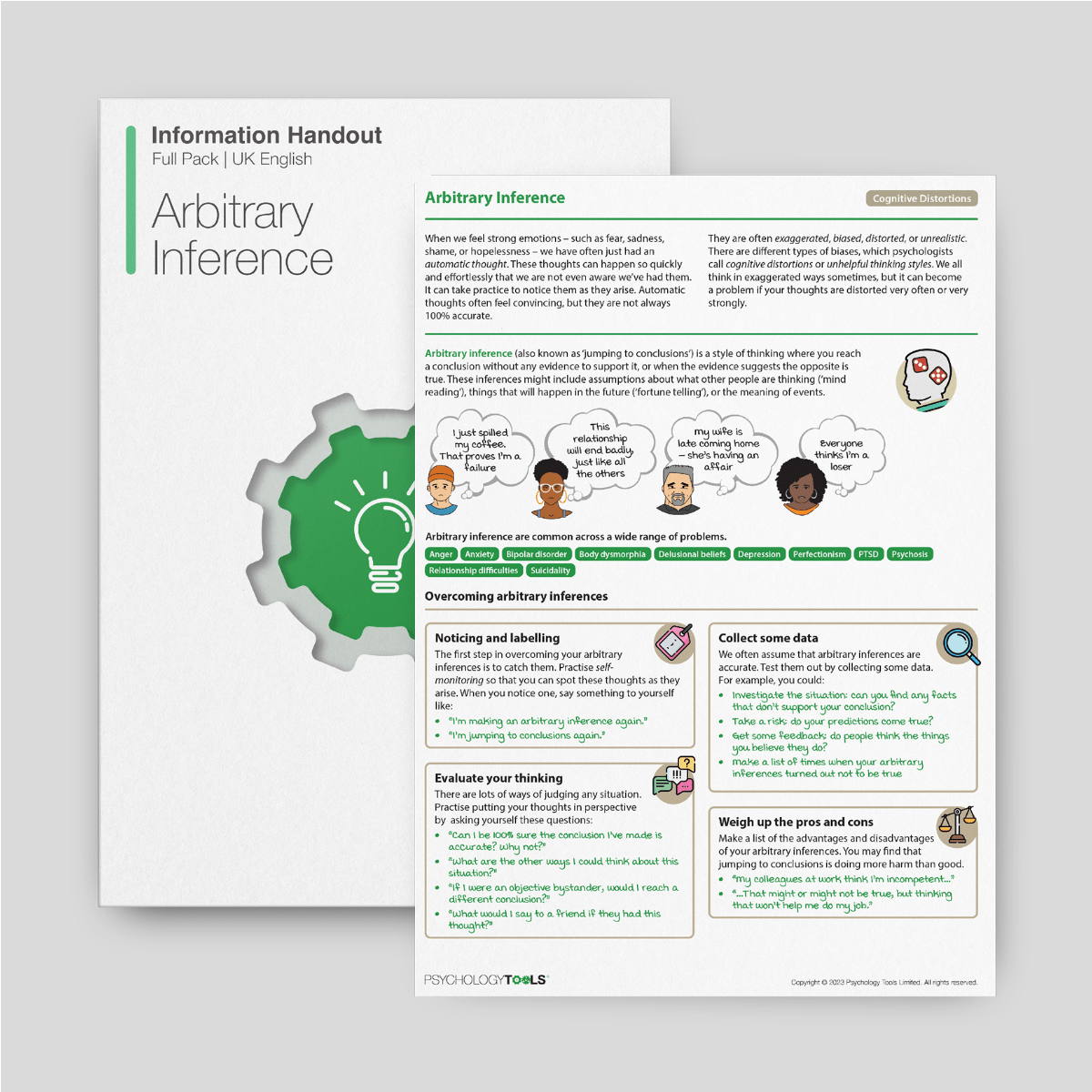2nd May 2023 Newsletter


Psychology Tools
Published
Work more effectively with common thinking biases
Identifying biased automatic thoughts and reappraising unhelpful thinking is a core element of traditional CBT. Recognizing the presence and nature of distortions is a useful way of introducing this concept – clients are often quick to identify with the concept of ‘unhelpful thinking styles’ and to recognize their habitual biases.
We’ve developed a new series covering 20 of the most clinically-relevant cognitive distortions. Designed to help clients and therapists work more effectively with common thinking biases, each handout includes a combination of unique psychoeducation and practical elements.
What can I download today?
The full series will be available to all members on any of our paid subscription plans. Three resources have been released today, with All-Or-Nothing Thinking already available.

Arbitrary Inference
Arbitrary inference (also referred to as ‘arbitrary interpretations’ and ‘jumping to conclusions’) is one of the earliest and broadest cognitive distortions identified in cognitive therapy. Arbitrary inferences are associated with a variety of faulty reasoning processes and linked with a wide range of disorders.

Catastrophizing
Individuals who catastrophize jump to the worst possible conclusions, think about the most catastrophic outcomes, and assume these scenarios are likely to occur. People who habitually use a catastrophizing thinking style typically have several ‘blind spots’ around future outcomes and their ability to cope with unfortunate events.

Emotional Reasoning
Unfortunately, our emotional reactions can be problematic. ‘Emotional reasoning’ (also referred to as ‘ex-consequentia reasoning’ and ‘feeling-driven thinking’) is a cognitive distortion associated with selective abstraction: “forming an interpretation… when there is no factual evidence to support the conclusion, or when the conclusion is contrary to the evidence”.
What’s great about this series?
Extensive range
The full series will encompass an expanded range of 20 clinically-relevant thinking biases including permissive thinking, social comparison, and thought-action fusion. We aim to support you to effectively address all of the cognitive distortions experienced by your clients. Written in friendly, accessible language the resources are ideal to use in sessions, and can be given as part of self-practice.
Problem specific handouts
Are your guilty clients prone to hindsight bias? Different cognitive distortions are associated with different clinical presentations. With a separate handout for each unhelpful thinking style, you can give clients more focused, relevant information. Each resource describes a different cognitive bias, gives examples, and outlines effective techniques for challenging it.
Extra therapist guidance
It’s not enough to hope that your clients ‘get it’. That’s why we’ve incorporated additional guidance for clinicians throughout this series. As well as helpful theoretical background, each pack includes useful prompts, client blind spots, information, a list of disorders the thinking bias may be linked to, and suggested treatment options.

But what if I’m not a member?
If you sign up to any of our paid accounts you can start using this series straight away, as well as hundreds of other resources and tools. Don’t forget, with a paid account all resources are watermark free and trial download limits are removed.
We hope you find the collection useful – let us know!
Get sent more useful pieces like this!
Sign up to our monthly newsletter full of helpful ideas, tools, and tips for mental health professionals like you. You'll find out about our latest resources, and you can also read our reviews of the latest research.
It's completely free and you can unsubscribe at any time.